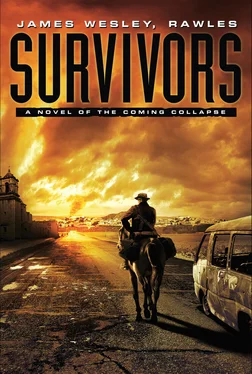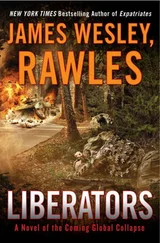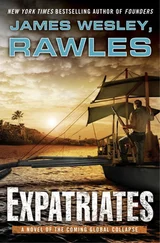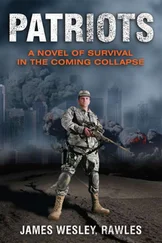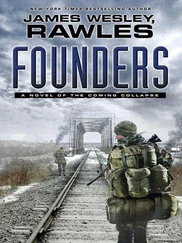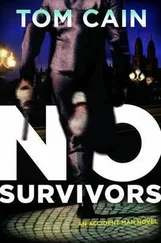Lars exclaimed, “Outstanding! Thank you, sir!” Lars pulled out a notepad and pen and went on, scribbling notes, “Let’s do the math. Okay, not counting our in-town quick-reaction force-which will be set up on the Minuteman or volunteer fire department model-we’ll have four Joes manning each roadblock 24/7. Three eight-hour shifts per day, that’s twelve men per roadblock, and manning three separate roadblocks equals thirty-six trigger-pullers that need to get from Point A to Point B, every day. Each will need an average of one gallon of gas per day; I’m sure that they’ll carpool, but the leftover gas will be a perk of the job. So 36 gallons of gas per day times 365, gives us… uh… 13,140 gallons.”
“Fair enough, Lars. But you’ll need a bit more fuel to get the vehicles and materials in place to construct your blocking points, and some for your QRF’s vehicles. So… I’ll issue vouchers for 15,000 gallons of gas annually, out of my own pocket. We only have a rudimentary printing facility, and I worry a lot about forgery, so I’ll just open a standing account for each Bloomfield COPS man: 30 gallons monthly. Each time they get gas here at the plant, it will be deducted. It’s the same sorta thing that I’ve done for the staff at my ranch and for the refinery employees. It’s pretty simple accounting.”
“And darned generous of you.”
“Hey, I wouldn’t be doing this unless it was in my own best interest. It’s not just the ‘24/7, 365’ that I worry about. Its the ‘24/7, 360.’ As in: 360 degrees. I want my flanks covered. So far as I know, I own the only operational light products refinery this side of Texas. That’s bound to be a tempting target.”
“It’s a humongous target.”
“Just promise me that if you go work for the folks in Farmington, you won’t go poaching for manpower in Bloomfield. We need to keep all our men with military training here ,” L. Roy said.
“You have my word, Mr. Martin.”
“Did you have any other questions?”
“I’m curious. I’ve seen the ten-liter Scepter fuel cans that you’ve been selling, and I’ve heard that you bought thousands of them. That was quite prescient of you. But why do you have them priced at eight bucks in silver apiece? That’s more than a week’s pay these days. You bought them months ago, before the inflation went crazy, so they must have cost a tenth of your retail price for them in the equivalent-back in the paper dollars.”
L. Roy leaned back in his chair and gazed upward. After a lull he replied: “Three reasons: Reason one, I don’t have an unlimited supply, and we had no way of knowing when the grid might go back down locally, and if and when the big grids will go back up online. So I need to make them last. This way, when I pay my employees partly in gasoline, they’ll be sure to have containers. Reason two, I need to have fuel that is packaged for barter over long distances. The way I see it, in a couple of years here in a fuel-producing region, it will be tires that will be in short supply, and I need to be able to trade for those. Reason three is that I need more than just fuel to barter for vehicles and heavy weapons. We need to amass some more armored vehicles. So if we go out far afield, trading with people that are ‘fuel poor and vehicle rich,’ then again I need to have the requisite containers.”
“That makes sense. But, ah, what do you mean ‘more’ armored vehicles?”
“A slip of the tongue, Lars. Please don’t mention it to anyone, but I have an old M8 Greyhound-that’s a wheeled APC from World War II that’s being restored and modified up at the shop at my ranch. After that’s finished, I plan to keep it garaged here at the plant, sort of a ‘hidden stinger.’ But if things continue to deteriorate the way I imagine, we’re going to need a lot more armor to be able to put up a creditable defense.” After a pause he added: “Okay, then. We have an agreement!”
They shook hands.
As Laine stood up, he glanced over his left shoulder, and noticed a caged ladderway, leading to a trap door to the roof. Pointing with the muzzle of his rifle, he asked, “Does that ladder lead to your command post?”
“Yep. That’s my CP. You’re a very observant individual.”
“Well, I admire a man that puts an emphasis on substance over style. I can see why you picked this room for your office. I would have done the same thing.”
“There is a certain relief in change, even though it be from bad to worse; as I have found in traveling in a stage-coach, that it is often a comfort to shift one’s position and be bruised in a new place.”
— Washington Irving
Eastern France Late November and Early December, the First Year
Andy’s cold and wet bicycle ride to the coast of France through the northern Departements was grueling, and took him two weeks of hard riding. Many of the nights were miserable, with few opportunities to dry his clothes. The roads were only lightly traveled, and he had no offers of rides, except for one elderly man who was driving a tiny two-seat Renault R5. There would be no room for Andy’s bike or trailer, so he declined.
He camped in the woods most nights. As his stock of food dwindled, his trailer got lighter, and he was able to travel faster. He was only able to find a few bits of food that were still affordable. This included three retort-packaged “bricks” of vegetable soup and a couple of half-kilo plastic packets of instant oatmeal. Eating these cold was unappetizing but nourishing. Buying them expended most of Laine’s remaining euros.
As he passed from Picardie into Nord-Pas-de-Calais, the population density increased. This made Andy nervous about his personal safety. His opportunities to camp unobserved in woodlands got further and further apart. His greatest fear was being attacked while sleeping. He prayed often and as usual kept his pistol handy inside his sleeping bag. While he was near the town of Douai, a large dog came sniffing around his camp at night. Laine half shouted: “Chien! Vas-y! Vas-y! Va-t’en!” That worked, but he had great difficulty getting back to sleep after the dog had left.
Laine was surprised to find the Port of Calais guarded by both police and soldiers. He was able to pass though the outer perimeter without being questioned, but at the inner cordon , he was stopped and asked by a French Army sergeant for his papers and told that the port was closed to civilian traffic. Andy pulled out his Army Reserve ID card and asked to speak with the harbormaster. This turned into a convoluted series of short meetings and interrogations, first with the lieutenant in charge of the cordon , then the harbor security officer, then with the harbormaster’s office, and finally with the harbormaster himself. The harbormaster, Arsene Paquet, seemed distracted by the radio traffic, but he was amiable and sounded sincerely concerned about Laine’s desire to get home to the United States.
Paquet immediately made three phone calls and punched in two SMS messages on his text phone. The resulting word was that there were no French ships that had filed sailing plans to the United States or Mexico. Paquet offered in a conciliatory voice, “I am sorry, monsieur , only from America, not to , for at least months in the future. The insurance companies will not allow it. To be precise, I should say that if they sail, it will be with the knowledge that their insurance is not in effect. Few would take that risk. This insurance situation is uniform for all ships that are European Common Market-flagged, or etranger -flagged but owned by EC-headquartered companies. But I think the situation may be different in England.”
Читать дальше
